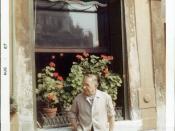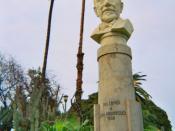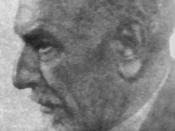IntroductionLuigi Pirandello, author, Nobel laureate and giant in the world of letters was born to an affluent family near Agrigento, Sicily, on June 28, 1867. How tempting it is to speculate that the intense preoccupation with illusion and deception that haunted Pirandello was due to his struggles with his wife's madness, or that the deception of which he spoke was the deception necessary to allow him to submit to a prearranged marriage to a pre-psychotic woman. These formulations may be appealing, but they are speculations. We do not have the poet here to reveal him, nor are we privileged to hear his free associations. (Coppolillo 411-35) We only know that he held before us images of a human condition that had touched human awareness for eons, but which had never before been described with the poignancy and clarity that his descriptions achieved. It is perhaps easier to empathize with and understand the phenomena of illusion and self-deception and the human struggle to differentiate illusion and reality if we used as examples madness and psychological illness.
But this would pathologize and distort the concept that Pirandello was seeking to portray. He felt that a human being's struggle to differentiate illusion and reality was universal and that evidence for it could be found in everyday life. For this reason the play L'uomo dal Fiore in Bocca, translated beautifully by Gatti and Doyle as The Man with the Flower in His Mouth, conveys Pirandello's thesis so poignantly and so convincingly. (Rapaport 13-35)Henry IVIn Henry IV the theme is madness, which Pirandello proposes is just under the surface of every personality and which he feels may be, for some people, more tolerable and perhaps more soothing and gratifying, than attempts to live with reality. It was to be decades before this...



Good Format
Good format.
0 out of 0 people found this comment useful.